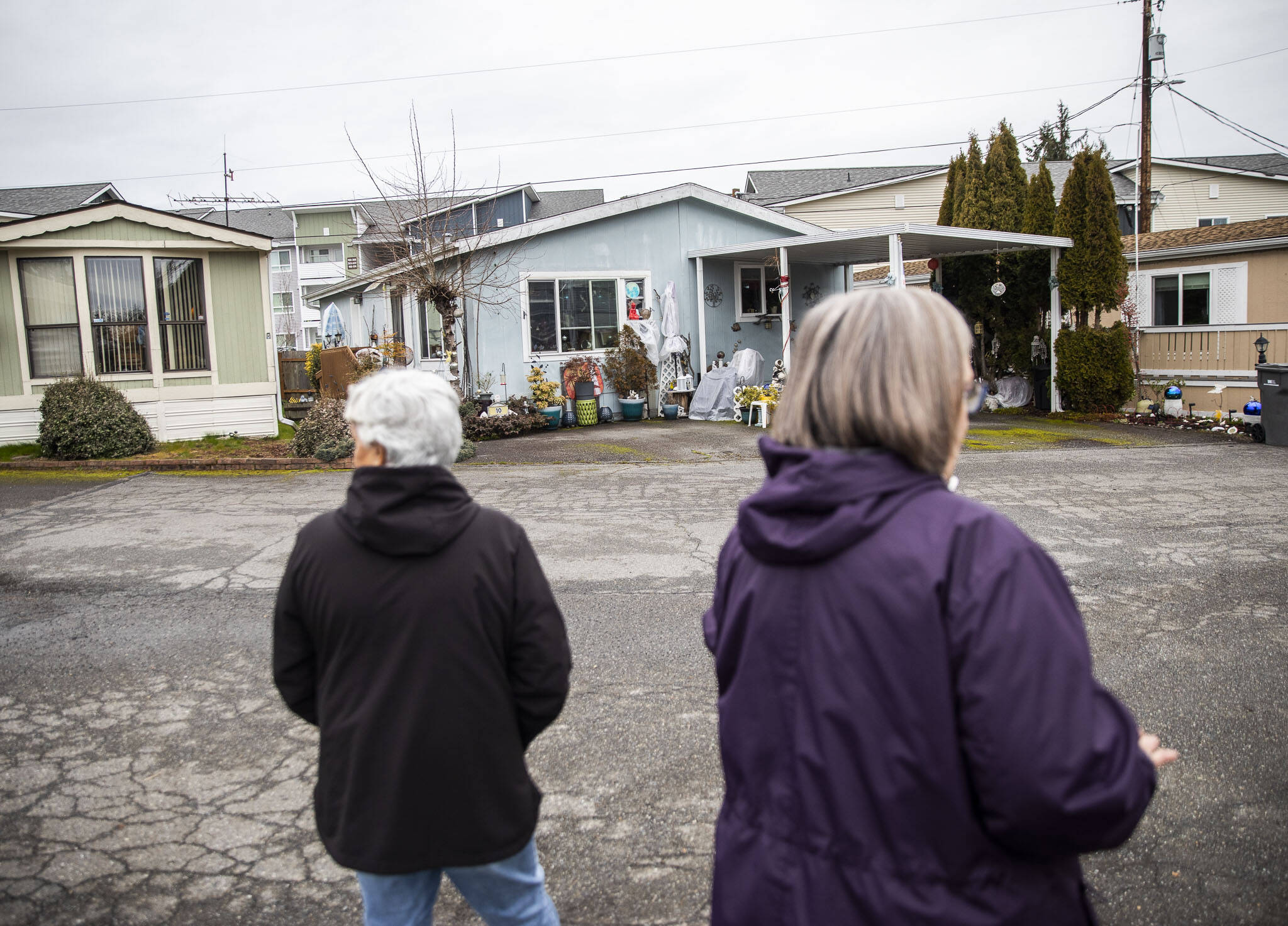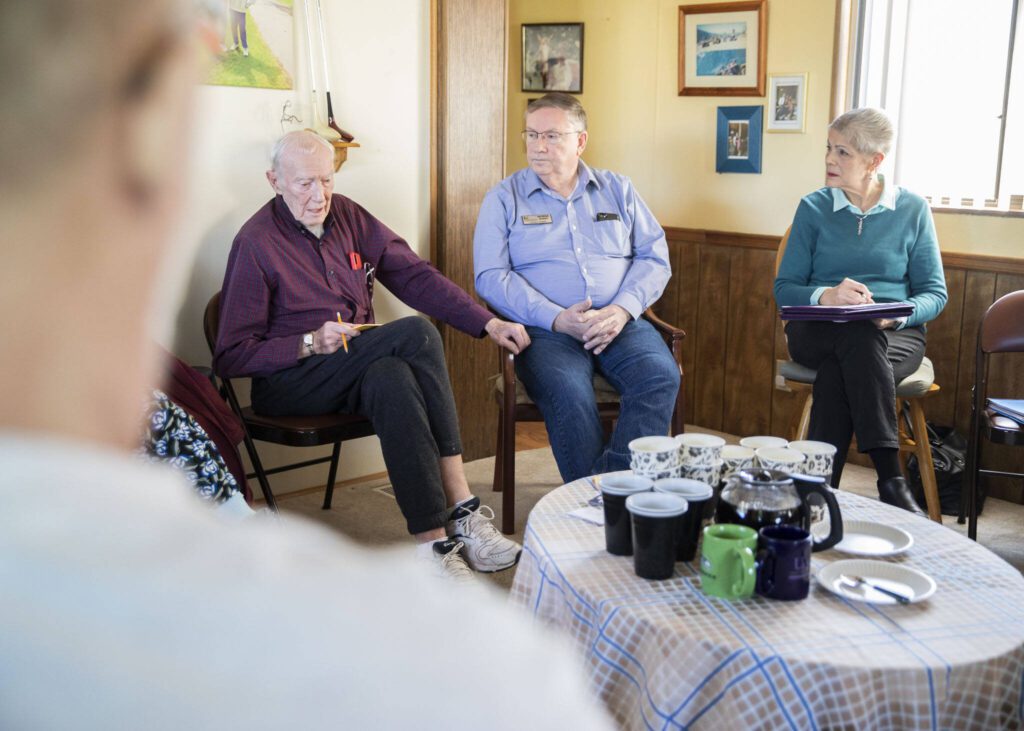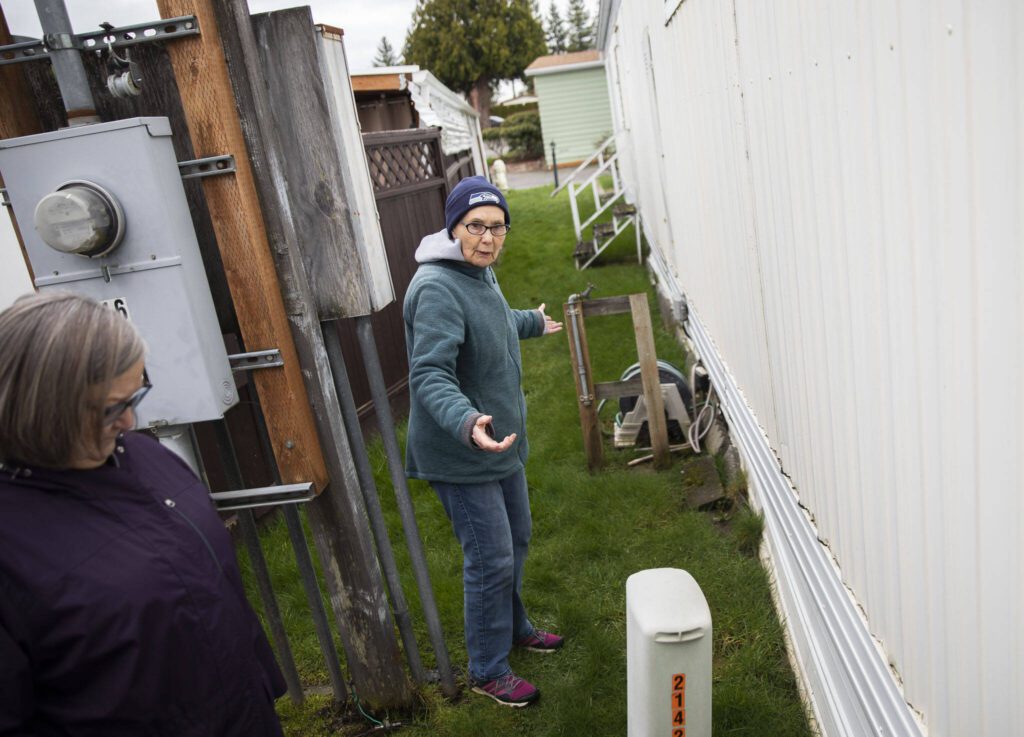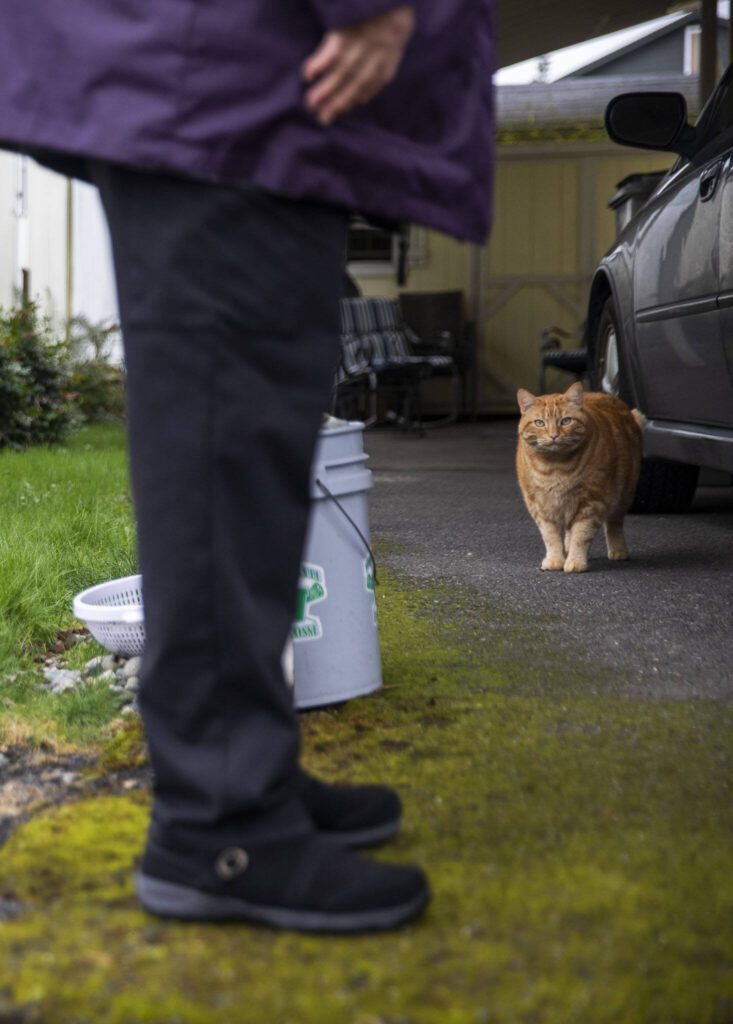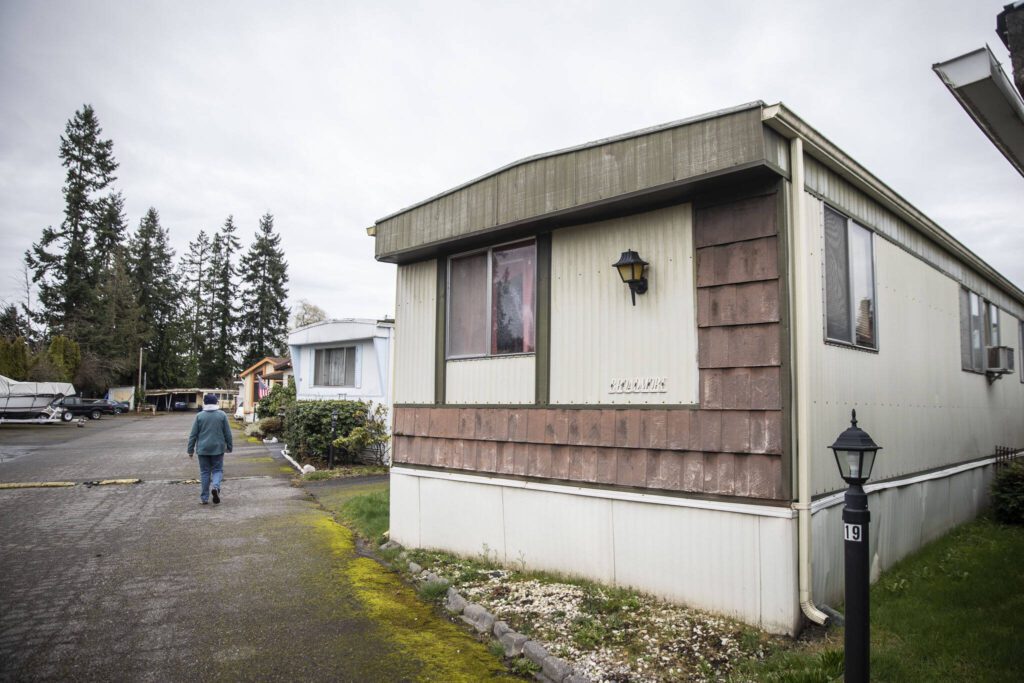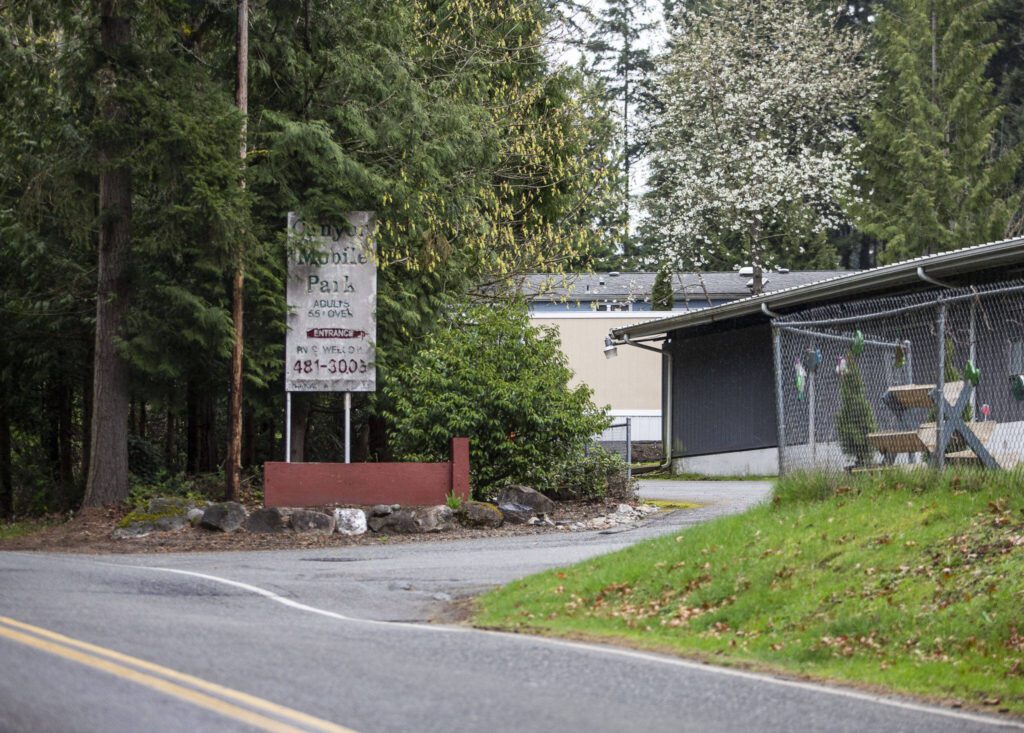BOTHELL — In 2004, Susan Lockyer bought her manufactured home as a retirement plan.
Moving from Seattle slashed her monthly housing costs from $900 to $425.
Lockyer, 78, would still be paying “lot” rent, like many other manufactured home owners who lease the land under their houses.
With a Social Security payment of $1,419, she thought she could afford the rent increases, only $10 to $30 each year.
“This was a good plan. And it was a good plan for 18 years,” she said. “Until (GSC Investments) bought the park. The first thing that happened is the rent was raised $100. From $620 to $720.”
In June 2023, GSC bought Canyon in Bothell and Royalwood Estates in Lynnwood, communities where all residents are 55 or older. GSC also bought other mobile home communities in Washington that year. Many residents who spoke with The Daily Herald said they felt stressed and afraid of being pushed toward homelessness.
In two months, Lockyer will be facing another $100 annual increase, a nearly 14% rent hike. The company will also no longer cover water and garbage fees, raising housing costs even more.
Representatives from GSC Investments, also known as Collective Communities, did not respond to requests for comment. GSC is incorporated in Delaware.
This past legislative session, Democrats introduced House Bill 2114 in Olympia, seeking to limit rent increases by 7%. But opposition from Republicans and divided Democratic lawmakers stalled the bill. It passed the House, but didn’t make it out of committee in the Senate.
For Lockyer and other manufactured home owners, the prospect of ever-increasing rents leaves them in a precarious position.
‘Nowhere else to cut’
Manufactured home owners are at the mercy of park owners who may raise their “space rent” each year with no limitations. It’s expensive, and sometimes impossible, to move a home. According to Forbes, moving a manufactured home costs $9,000 on average — even if the slight misnomer “mobile home” has stuck around.
In the past decade, corporate investors have discovered how lucrative manufactured homes can be. GSC has bought 21 mobile home communities in Washington.
According to its website, GSC seeks to balance offering “high-quality, safe and affordable housing” and “consistent cash flow, appreciation, and preservation of investor principal.”
Lockyer, a retired paralegal and accountant, said she’s frugal and takes advantage of a thin social safety net.
She pays for discounted electricity, is exempt from property taxes and receives food stamps that allow her to pay $9.95 per month for internet.
She doesn’t have a car, so she relies on friends to drive her to the store. Lockyer cut meat out of her diet years ago and grows her own vegetables: peas, kale, spinach, onions, beets, carrots and eggplant.
“I make my own lattes, even,” she said. “I’ve got nowhere else to cut.”
Finding it difficult to shrink her budget further, Lockyer is fighting back by complaining to the state attorney general — and any media who will listen.
‘A landlord may increase rent’
In 1999, the state Legislature created the Manufactured/Mobile Home Landlord-Tenant Act, to establish rights and obligations between landlords and tenants.
Eight years later, legislators created the Manufactured Housing Dispute Resolution Program to resolve disputes about alleged violations of the act. The program mediates between landlords and manufactured home owners. If they can’t reach an agreement, the program “may move forward with enforcement action,” according to its website.
According to the program’s 2023 annual report, rent increases are the top complaint among manufactured home owners.
But don’t expect the program to help limit increases, said Brionna Aho, a spokesperson for the Office of the Attorney General.
“There is no provision in the act that limits how much a landlord may increase rent,” she said via email this week.
The program can step in if landlords raise rent without proper notification, but sometimes all it can do is refer complaints to available social services, Aho said.
Last year’s report also said the program was understaffed, while complaints have continued to increase each year since 2021: starting at 392, then 582, then 734 last year. Aho said the program already received 192 complaints through the first quarter of 2024.
‘A done deal’
In 2005, the Canyon residents protested a petition to rezone the community from single-family to multi-family zoning, usually a first step toward redevelopment.
A few years later, they created a homeowners association, or HOA, that stood ready in case an outside developer tried to buy the manufactured home park.
In February 2023, when notified about the impending sale, Lockyer, then the registered agent of the HOA, emailed the park owner’s attorney Walt Olsen saying they wanted to place a bid.
She was told it was a “done deal.”
The sale was finalized June 30.
Since mid-July 2023, state law has required owners to notify residents of upcoming sales. Residents then have 70 days to form a co-op and tell the owner they’re interested in buying.
In October, the 35 residents of Sherwood Village in Mill Creek bought the land under their feet for $5 million.
Still, they are in the minority. As of February, residents have only bought three of 22 manufactured homes communities that have gone up for sale statewide since July.
Retaining manufactured home communities is key to increasing housing choices and avoiding displacement, according to Bothell’s Comprehensive Plan and Housing Strategy.
The city is conducting a community needs assessment that includes mobile home residents to learn more about their concerns.
But Bothell can’t limit rent increases on its own.
‘We’re homeowners’
Lockyer is disputing the new $33.09 garbage fee.
She believes if she must pay for garbage, she should be charged the lower $21.37 fee levied on residents, instead of a $33 fee charged to businesses.
“We’re homeowners, we’re not businesses,” she said.
She complained to management.
“There’s no way residents should have to pay excessive charges because (GSC Investments), not us, is a money-making enterprise,” she wrote in an email to property management.
She got an answer: “Consulting our attorneys, they confirmed that our billing practices align with this classification.”
Lockyer said the difference between the two prices could keep her from buying as much food as she needs. The attorney general’s office is looking into her complaint, Aho said.
Another resident, who requested anonymity out of fear of retaliation, said landlords should show “common decency.”
She said many residents prefer to stay silent.
“When you get older, you’re like, you know what, ‘I just don’t want to fight anymore,’” she said. “They feel vulnerable because of retaliation. They don’t want to risk it.”
Lockyer, on the other hand, is not afraid of retaliation.
“They better not!” she said. “I’m going to use bad language. Don’t (expletive) with me. I’ll win.”
‘Some sort of help’
In Lynnwood, residents of the manufactured homes at Royalwood Estates are facing similar problems.
The previous owners raised rent from $640 to $740 per month when the notice of sale was given to residents. Recently, new management announced an increase to $840 for June — a 13.5% increase. From then on, water, garbage sewer and storm drain will also be separate fees.
Meanwhile, some residents are pointing at overdue repairs.
Last month, Lynnwood City Council member George Hurst met with a dozen residents to see how they could work together to prevent displacement.
Hurst is working on creating a task force about manufactured housing for the Lynnwood City Council and organizing a town hall meeting with all parties involved.
He also has spoken to county human services about using money from the 0.1% sales taxes meant to help affordable housing to help residents.
“I’m just trying to basically reach out to anybody I can to see if we can find some sort of help for these folks,” Hurst said.
One reason Patsy Gilbert loves living in Royalwood is because she has two brothers and two cousins also living there. She checks on them at least once a week and they go out to breakfast every Sunday.
Now she worries about her younger brother, who’s on a limited income and worries about future increases.
“He goes: ‘I don’t know what I’m going to do. I can’t afford it.’”
Correction: A previous version of this article misstated how far House Bill 2114 made it in the state Legislature.
Aina de Lapparent Alvarez: 425-339-3449; aina.alvarez@heraldnet.com; Twitter: @Ainadla.
Talk to us
> Give us your news tips.
> Send us a letter to the editor.
> More Herald contact information.
